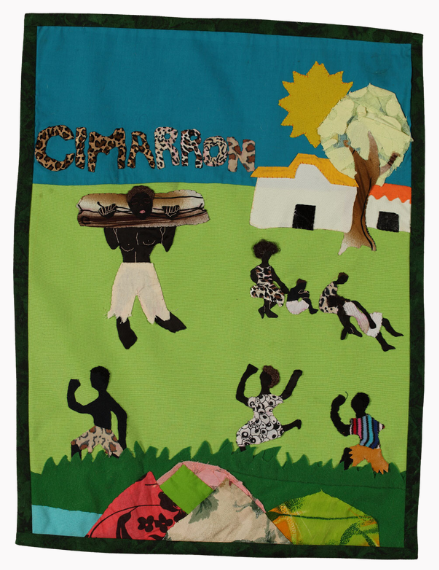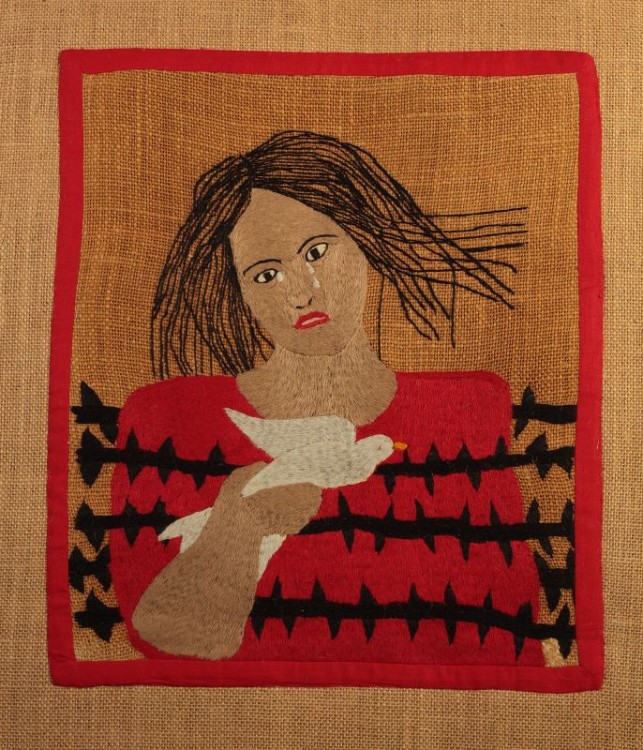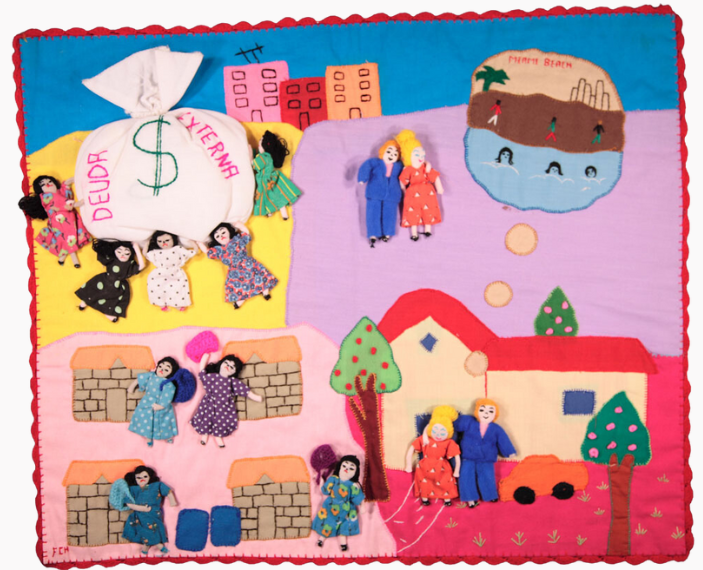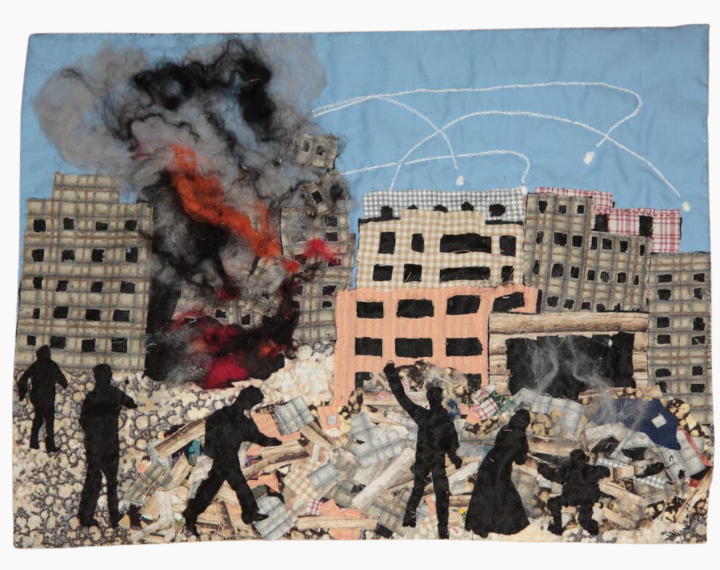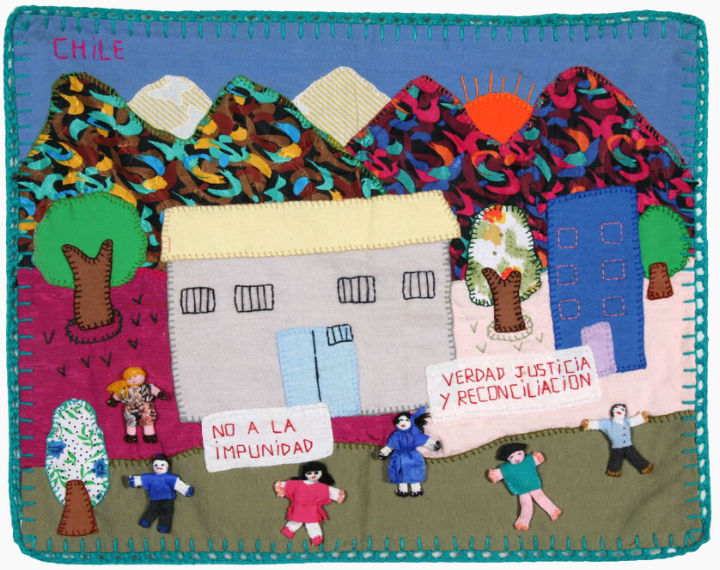
Conflict Textiles
When words are not enough to express lived experiences of violence, stitching and sewing emerge as textile language.
Curator Roberta Bacic has described this collaboration as innovative, noting that “…textiles are seldom recognised or included in political contexts”.
We regularly include pieces from the Conflict Textiles collection in the Troubles and Beyond exhibition. Our recent acquisition of these 14 pieces enables us to engage with different perspectives and experiences of violence and conflict, human rights violations, poverty, oppression and environmental issues.
En el lado “bueno” de la valla / On the "good" side of the fence (2015) by Antonia Amador

This arpillera focuses on the journey made by migrants to Europe from Africa by sea. The artist Antonia Amador, enraged by stories of death and exploitation, said of this piece: 'On the “good” side of the fence [shows] that…while on the boat they never thought they would find their death.’
She graphically portrays the arrival of these asylum seekers and migrants who ‘believed they [were coming] to paradise’, but instead, she tells us, ‘it was the police that awaited them on the shore of the peninsula.’
Penurias en nuestra población / Hardship in our community (1979) by Fundación de Ayuda Social de las Iglesias Cristianas (FASIC) workshop, Chile

In this nine-panel arpillera, arpilleristas from a FASIC (Fundación de Ayuda Social de las Iglesias Cristianas) workshop give us a startling insight into the harsh reality of life during the Pinochet dictatorship.
Through these “windows” they depict their experiences of a community exposing, denouncing and resisting the violence and multiple hardships they are forced to endure. By stitching their stories they ensure that this violent, repressive period of Chilean history will not be forgotten.
Nie wieder! / Never again! by Heidi Drahota

Created for an exhibition in the Netherlands in May 2015 to mark 70 years since the end of the Second World War. This textile depicts a scene at Auschwitz. Heidi said that, '70 years ago the people of Germany were liberated from National Socialism. Now, 70 years later, I want to remind (the world) that these things must never happen again.'
Where Are They? (2019) by Irene MacWilliam

‘Where Are They?’ by Irene MacWilliam draws attention to the ongoing issue of the ‘disappeared’ across the world. Those killed and buried in secret during the Troubles are also remembered in this piece. The multiple hunched figures within the piece convey the scale of the ‘disappeared’ where the red glaring question ‘Where are they?’ marked across the piece demands answers and justice.
Irene’s focus is on “the anguish in the families of those who disappear… the situation of families being rent apart and how they try to find information to help them in their grief”. The red, torn pieces of fabric symbolises their despair at “the limited success of the searches”, whilst “finding scraps of clothing gives hope of recovering their (loved one’s) remains”.
Irene MacWilliam is a well-known textile artist and we recently acquired her series of annual events quilts for the Ulster Folk Museum collection.
No going back (2009) arpillera by Sonia Copeland

'No going back’ by Sonia Copeland. Sonia explains: "My piece shows the Belfast City Hall, and in the foreground, a representation of one of the cross-community demonstrations, which followed the murders of Constable Stephen Carroll and Sappers Mark Quinsy and Patrick Asimkar by so called 'Republican terrorists'."
This demonstration of support for the victims and their families was important to Sonia, who had served in the Royal Ulster Constabulary (RUC) during the worst years of The Troubles and had suffered as a result of terrorist attacks on four occasions.
The Africa Quilt (2009) quilt by Roland Agbage (Nigeria) and Polly Eaton (England)

The Africa Quilt was made by Roland Agbage, a young quilt-maker from Kogi State in Nigeria and designed with Polly Eaton from Britain, who lived in Abuja Nigeria for many years. It depicts the devastating impact of the exploitation of Africa's natural resources, on both its people and landscape.
The quilt shows us that the abundance of Africa has gone a long way to support the lifestyles of those in the wealthier nations of the world.
No contaminar / Do not pollute (c.1983) arpillera anonymous, Chile

No contaminar / Do not pollute, an anonymous arpillera, depicts the effects of pollution on the inhabitants of a shantytown in the suburbs of Santiago and was made in one of the Vicaría de la Solidaridad workshops.
Santiago's air pollution, primarily from heavy industry and also from a rapidly increasing population, represents a huge challenge for the authorities responsible for reducing the damage caused during the years of environmental negligence. Air pollution levels in Santiago have had significant effects on human health, including premature death and respiratory diseases such as chronic bronchitis, pneumonia, and asthma.
Explore more conflict textiles
Threads of Empowerment: Conflict Textiles International Journey
Take a behind-the-scenes look at the exhibition installation with our Senior Curators of Art & History, and Conflict Textiles Curator Roberta Bacic.
Explore the different experiences of conflict, oppression and human rights violations across the world through textiles. Part of Belfast International Arts Festival.
